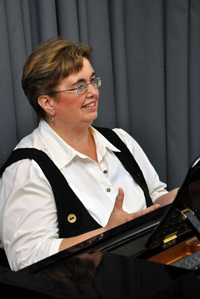
Phil Farnsworth
Sharon Brown
For media inquiries, please contact Media Relations
Sharon Brown has been a singer, conductor, and teacher in the Boston area for almost 25 years. As a faculty member in Berklee's Voice Department, she teaches vocal technique classes, the musical theater workshop, and vocal pedagogy as well as private students. She has also taught at Simmons College, Boston Conservatory, and Northeastern University. Her performing credits as a mezzo-soprano include many years with Boston Lyric Opera Chorus. Brown has also sung with Boston Academy, Intermezzo Chamber Opera, and Salisbury Lyric Opera in addition to singing oratorio with several orchestras in the area.
As a conductor, Brown founded and led the Boston Conservatory Women's Chorus for seven years and recently retired after 20 years as the music director for the Fisk Memorial United Methodist Church in Natick, Massachusetts. She also conducted the Simmons College Choral for four years and led the Masterworks Choral in two of their Summer Sings. Brown holds both a bachelor's and master's degree in vocal performance from the Boston Conservatory, where she studied with Elisabeth Phinney.
- Performances with Boston Lyric Opera, Longwood Opera, Associate Artists, and Boston Academy of Music
- Former music director for Fisk Memorial United Methodist Church in Natick, Massachusetts
